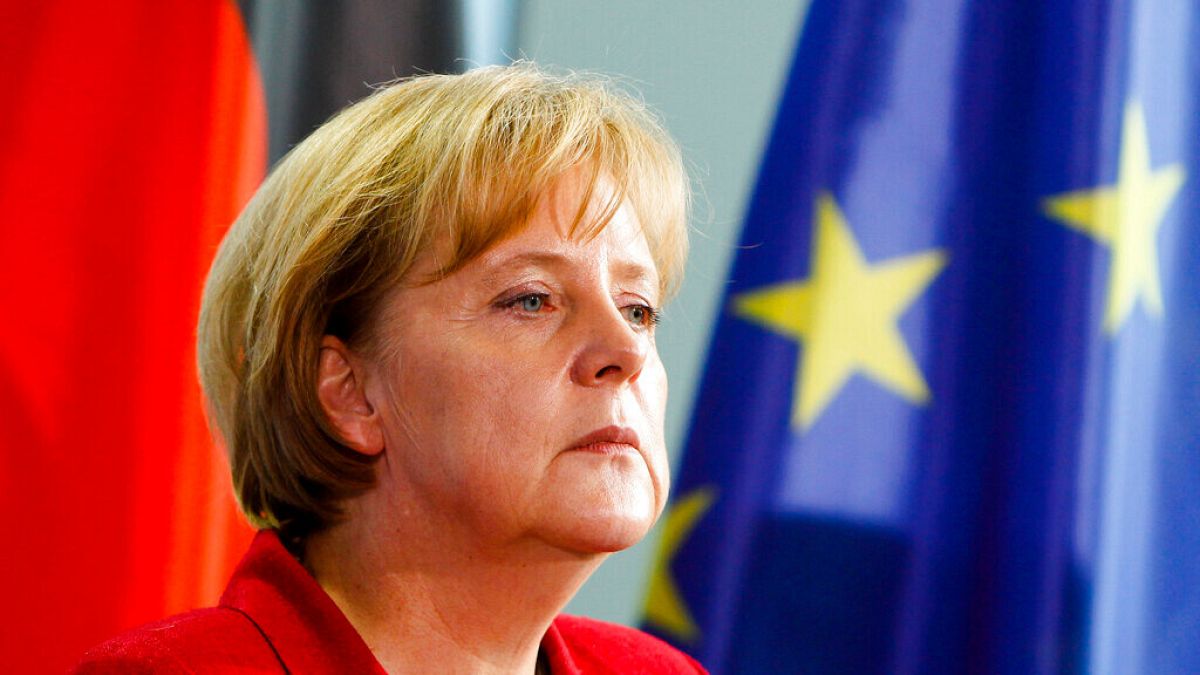Former German Chancellor Angela Merkel, who served for 16 years, reflects on her childhood, time in office, and her “worry” for the future in her new memoir.
After Donald Trump’s election to the White House in 2016, then-German Chancellor Angela Merkel gave a speech pushing for unity for which she was labelled the “leader of the free world.”
This general sense of respect followed the former German Chancellor when she left office in 2021 relatively popular both at home and abroad. Merkel steered Germany through multiple seismic events including the financial crisis, the 2015 migrant crisis and Russia’s annexation of Crimea in 2014.
Her first-ever memoir, released on Tuesday, finds the former chancellor both justifying and regretting decisions she made in power, expressing concern for the current state of the world and its future.
‘Won’t apologise’
Merkel has come under criticism, particularly in Ukraine, for her approach towards Russia during her time in office. She is particularly blamed for encouraging Russia’s aggression by being too soft on the country as well as Germany’s reliance on cheap Russian gas.
The former German leader has denied that her decisions would have prevented Russia’s full-scale invasion in 2022, after she left office. Merkel points to a key summit in 2008 on Ukraine’s NATO accession talks, in which she blocked Kyiv’s pathway to NATO membership.
She said she is convinced allowing Ukraine to join NATO earlier would have only provoked Russian President Vladimir Putin earlier, who used Ukraine’s NATO accession as justification for his full-scale invasion of Ukraine, and that she “wouldn’t apologise” for her stance on Russia during her tenure.
Journalist and author of a previous biography of Angela Merkel, “Die Kanzlerin”, Ursula Weidenfeld said that the former leader was driven by pragmatism above all else.
“As far as Russia is concerned, the crisis has only just begun. Angela Merkel’s political principle was: ‘I act when I can act and not when I want to act’,” Weidenfeld said.
In her book, excerpts obtained by The Guardian reveal that Merkel was “tormented” by the outcome of the 2016 Brexit referendum when the United Kingdom voted by a slim majority to leave the European Union.
Merkel viewed the vote as a “disgrace” for the EU and was dismayed by the idea she might have done more to help during pre-referendum negotiations with then-British prime minister David Cameron, who was himself keen for the UK to stay.
Concern over Trump and Musk
In her new novel, Merkel is sharply critical of Trump who is set to begin his second term as US President.
“It seemed that his main aim was to make the person he was talking to feel guilty” Merkel writes of Trump, who she dealt with during her time in power. She also says Trump was driven by grievance and was “transactional” in his negotiating style.
Merkel has extended her criticism to tech billionaire Elon Musk, who has been tasked with leading a newly created US department of government efficiency. In an interview with Der Spiegel before the release of her book, Merkel said there was a “visible alliance” between Trump and “Silicon Valley.”
“Politics must determine the social balance between the powerful and ordinary citizens” she said, adding that the strong influence of companies on politics was an “unprecedented challenge.”
The future of the CDU
Merkel’s book has been released as Germany faces elections on 23 February, which were unexpectedly brought forward after Chancellor Olaf Scholz’s coalition government collapsed.
The party she belonged to, the Christian Democratic Union (CDU), is poised to regain power, leading with 32% in the latest poll by public broadcaster ZDF.
The CDU’s new leader, Friedrich Merz, represents the party’s more conservative wing, a shift critics say Merkel moved away from during her tenure.
Merz also takes a much harder stance on migration than his predecessor, who notably opened Germany’s borders to asylum seekers from Syria in 2015.
“He (Merz) is a different kind of leader than Olaf Scholz, and certainly a completely different kind of temperament than Angela Merkel. He’s impulsive, he’s quick, and he’s personally touchy,” Weidenfeld says.
“Merkel was someone who had a form of constancy and composure. I think that convinced a lot of people that she was a good person to lead this country through the various crises that occurred during her time in office.”
Checkout latest world news below links :
World News || Latest News || U.S. News
The post Merkel confronts her legacy in long-awaited memoir appeared first on WorldNewsEra.

